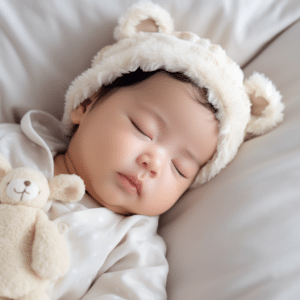Safe Sleeping Practices and Tips for Newborns
Safe Sleeping Practices for Newborns: Newborns cannot differentiate between day and night. They sleep all day and night, and because their tiny stomachs can’t store enough breastmilk or formula to keep them satisfied for lengthy periods, they wake up frequently to eat, regardless of the time of day or night.
As a result, newborns should always sleep close to their parents during the night. But how close should newborns sleep to their parents? Is it possible for both parents to sleep with a newborn? To learn more, keep reading this article.

Can Both Parents Sleep With a Newborn?
Both parents sleeping with their newborn can seem to be beneficial because it allows them to practice attachment parenting. It also allows for the newborn’s requirements to be met quickly and without stress.
However, having a newborn in a regular bed with two parents can be extremely risky. This is due to the potential of suffocation and entrapment deaths for a newborn sleeping between two parents. This can happen when a parent rolls over on the newborn (which frequently occurs when the parent is intoxicated) or when the newborn is wrapped in heavy or puffy blankets.
There are techniques to reduce these dangers. They include never going to bed with a newborn when intoxicated, never putting the newborn in between the parents, and avoiding bulky bedding. Nonetheless, the risk will never be zero and the practice is still not advised.
How Should Newborn Babies Sleep?
It would be best if you chose to room-share with your newborn during the first few months of their existence. Room-sharing is when you put your baby’s crib, play yard, portable crib, or bassinet in your bedroom rather than in a separate nursery. This keeps Safe Sleeping Practices for Newborns the infant close by and aids with night-time feeding, monitoring, and comforting.
Here are some suggestions for a safe sleeping environment for your child:
- Always put your infant to sleep on their back, not on their side or stomach. Since the AAP made this suggestion in 1992, the rate of SIDS has decreased dramatically.
- Utilize a firm sleeping surface. Cover the mattress with a tight-fitting sheet. Check if your crib, play yard, or bassinet complies with current safety regulations.
- Nothing else should be placed in your baby’s crib or bassinet. Pillows, soft toys, unfitted sheets, blankets, sheepskins, bumper pads, and comforters should be kept out of your child’s sleeping area.
- Overheating should be avoided. Dress your baby for the temperature in the room. Keep an eye out for signs of overheating, such as sweating or a hot sensation to the touch.
- Keep your child away from cigarette smokers. Secondhand smoke leads to an increased risk of SIDS.
- Use a pacifier to put your infant to sleep. But don’t force your infant to use the pacifier if they refuse. You don’t have to replace the pacifier if it falls out while your baby is sleeping.
How Long Should a Newborn Sleep?
Over the course of 24 hours, babies should obtain 14 to 17 hours of sleep. Some babies sleep as much as 18 to 19 hours each day.
Every couple of hours, newborns will wake up to eat. Breastfed babies eat every 2 to 3 hours on average. Bottle-fed babies are more likely to feed every 3 to 4 hours.
Infants who sleep for prolonged periods should be awakened to be fed. Until your baby exhibits good weight gain, which generally happens during the first couple of weeks, wake them every three to four hours to eat. Following that, you can let your infant sleep for greater lengths of time at night.
The first month of a baby’s existence can be the most difficult for parents, who may have to wake up several times during the night to care for the baby. Each infant has a unique sleep pattern. Some babies start sleeping through the night (for 5 to 6 hours at a time) as early as 2 to 3 months old, while others do not.
Can You Help Your Newborn Sleep?
Newborns have their schedules. You and your little one will settle into a routine over the next few weeks or months.
Your baby’s brain may take a few weeks to learn the difference between day and night. Unfortunately, there are no secrets to speeding this up, although it does help to keep things quiet and peaceful during feedings and diaper changes in the middle of the night.
Keep the lights down and resist the temptation to converse or play with your child. This sends them a message that the night is for sleeping. Allow your baby to fall asleep in the crib at night if possible so that they learn that it is a safe place to sleep.
Don’t try to keep your infant awake during the day in the hopes of a better night’s sleep. Infants who are overtired throughout the day have more difficulty sleeping at night than those who get enough sleep during the day.
It’s acceptable to rock, sing, and cuddle while your baby settles down if they are fussy. Swaddling (covering a crying infant in a soft blanket) can also assist in calming them down. “Spoiling” is not an issue throughout the first month of your baby’s existence. In fact, newborns held during the day are less likely to experience colic or be fussy.
When Can Both Parents Sleep With Their Baby?
According to experts, infants should sleep in their parents’ room without bed-sharing until they turn one year old. If the parents want to move the infant to a different room, they should wait until the child is six months old.

Conclusion
Safe Sleeping Practices for Newborns: We hope this article has helped answer some of your questions concerning newborns’ sleep. If you have a newborn, it is advisable that you share your bedroom with them without bed-sharing for at least one year. After that, you can share your bed with your child. If you prefer to move your child to a different room, you should wait until they are six months old.






